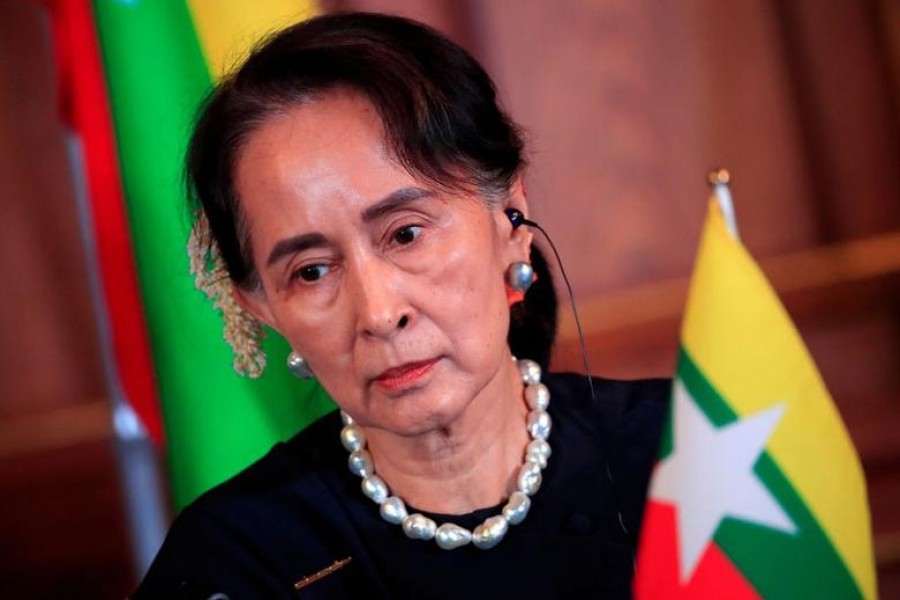
Published :
Updated :

The coup staged by the Burma's military (Tatmadaw in Burmese) on the morning of February 1 (Monday) has again taken the country back to where it had been for the most part of its existence as an free nation since it won its independence in 1948. The experiments in democracy, like in most other post-colonial nations of Asia, Africa and Latin America, had always been short-lived in this ethnic-strife torn South Asian country. Small wonder that the military, again as is the case in most other developing and least developed countries, is held with respect and love and looked upon as a symbol of national unity and sovereignty. Aware of their status in the eyes of the people, the military, too, never failed to take advantage of it. The last experiment in democracy that started in 2015 with Aung San Suu Kyi's National League for Democracy (NLD) winning a massive majority and then followed by last November's election that gave her party a still bigger victory, has finally ended with Monday's military takeover. Despite Suu Kyi and her party's stellar electoral performances in the elections, she or her party has never been able to take the full control of the post-election governments since 2015. For the military always remained the deciding force and kept a tight grip on the state affairs. And Suu Kyi had to accept it.
The popular perception about her having accepted the Burmese military's terms and share power with it in spite of her unchallenged popularity within the country and her party's superb electoral performances is that she wanted the fledgling democracy to survive and sustain. If that was truly her intention, it was misconceived as the latest military coup has proved. But questions still remain. Did Suu Kyi really fight all these years for democracy? Or was it for purely power? Her compromise, if it was for democracy's sake, has ultimately failed. But if it was driven by sheer greed for power that too has miserably failed. Now in her mid-70s, she has had again to embrace imprisonment. Though the US, the European democracies and the UN have condemned the coup and demanded Suu Kyi's release, she is no more the Asia's Mandela (Nelson Mandela) that she once was to the West as well as to the rest of the world. Her supposed love for democracy, even human rights, her nonviolent way of waging the struggle against the military rule in Burma that won her the Nobel Peace Prize in 1991 was put to an acid test in 2017 when the Myanmar military carried out a genocidal attack on the innocent civilian population, the ethnic Muslim minority, the Rohingya in the Country's western state of Rakhine. People of all ethnicities in Myanmar looked up to her as their only hope, their saviour. But her shameless stance in defence of the military's heinous role in Rakhine where the minority Muslims, the Rohingya, were massacred, their women were gang-raped and murdered and their children were thrown in the raging fire was deplorable. She refused to see the obvious and continued to term the reports in the world media about the murderous military campaign against the defenceless Rohingya Muslim population in the Rakhine State 'misinformation'. Even the satellite pictures of the burning villages in Rakhine, or the sight of the hundreds of thousands of Rohingya men, women and children fleeing the atrocities of the military failed to soften her heart. She even went to The Hague before the UN's highest court to defend Tatmadaw (Burmese military)'s indefensible acts in the Rakhine State.
Is it then too hard to imagine why the Burmese military has dared stage the coup? They know how Suu Kyi has fallen from grace-the West no more considers her an asset worth defending. The international condemnation that February 1's coup has still drawn was not for Suu Kyi as such. They would condemn in a similar language any overthrow of the legitimate elected government anywhere in the world.
As the reports go, Tatmadaw has kept Suu Kyi detained in her residence in Naypidaw. The police is learnt to have taken her in custody for various charges until February 15. No doubt more charges will be brought against her and her cabinet colleagues by the newly formed 11-member junta with the military chief Min Aung Hlaing at its head. This is the same military chief under whose direct watch was conducted one of the history's most abominable crimes against a people whose only fault, if any, was that they had a different ethnic origin, language, colour and creed. General Min's newly formed government has declared a state of emergency for a year.
What was to happen has happened in Burma. But what will happen to this 'Mother Suu' of her beloved supporters, the erstwhile darling of the West, 75-year-old Aung San Suu Kyi? No one knows. Perhaps few outside Burma even care to know. Her unprincipled stance in support of the military has proved to be her nemesis.
In the West as elsewhere, people once had a lot of interest in Suu Kyi and her country. So it was in Bangladesh. The youth of the late 1980s and 1990s, who waged a relentless struggle against the then military ruler of Bangladesh General Ershad, held Suu Kyi in great respect as a hero, an unwavering fighter against military dictatorship. But her unabashed support to the Burmese military during the carnage of the Rohingya who fled in droves to Bangladesh has caused to lose her image in their eyes.
No democracy-loving people can support the Burmese military's latest act of unseating a democratically elected government. People of Bangladesh, too, do not support it. They are certainly curious about what has happened to Suu Kyi, or even what more is in store for her. But they are, perhaps, not greatly concerned.


 For all latest news, follow The Financial Express Google News channel.
For all latest news, follow The Financial Express Google News channel.